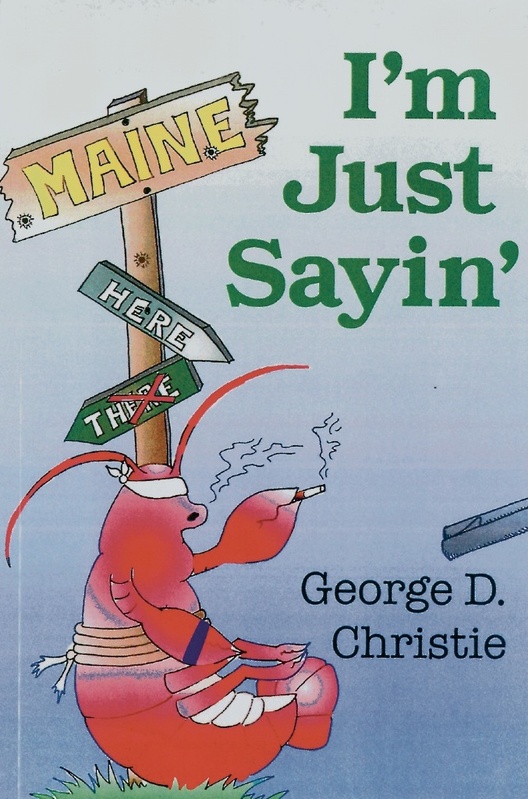I never had a fondness for books of “Maine humor.” You know, titles that focus on the supposed quirks of Down Easters and the oddness of the state’s locale.
Oh, it’s not the political incorrectness thing that bugs me; every state and its “typical inhabitants” (think Texas) has its foibles and deserves to take some lumps, along with shameless Chamber of Commerce accolades. It’s just that the same old truisms, the expected gags get passed along from Seba Smith (1792-1868) warmed up now and then by Artemus Ward or the “Bert and I” team, and to a new generation. Funny sometimes, often not.
On seeing the cover illustration of George D. Christie’s “I’m Just Sayin’ ” by Jennifer Lynn Baker, I was put on guard. Here was a blindfolded lobster, tied to a Maine road sign, an obligatory last cigarette with the business-end of a 12-gauge shotgun aimed in its direction. At 258 pages, which includes puffery about the author and his achievements, it appeared as if we were in for a nor’easter of a bloviation.
That, of course, proved true, but it is a much more enjoyable storm than my initial profiling had suggested. So, it is probably a good idea for reviewers to read books and not judge them by their, um, covers. Christie’s excellent subtitle is spot on: “If you’re going to own only one really, really great book about Maine, keep this next to it.” Choose your favorite.
First off, Christie does know more than a thing or two about the history of Maine. He gives us everything from the forest primeval, with squirrels and their continued inability to throw nuts, to “approximately 1,256,763 people” and B&Bs. That’s quite a task, made somewhat lighter by the discovery of reference sources that have eluded lesser historians, including Sir Arthur Conan Hoyle’s treatise, “The More Things Change, the Less Likely They Are to Remain the Same.”
Occasionally, there is a resort to the silly fabrication: “The Vikings eventually landed on the coast of Maine near present-day Blue Hill on June 3, 1004 at about, oh 2:30 or so in the afternoon, daylight savings.” Being a humorist, the author probably thought that would pass review, but he was assigned a know-it-all-reviewer.
Through 40 or so chapters (there is a “prologue,” “disclaimer” and a “Postlogue, or Post-log, or Log Post” as well), the Mainer by birth, Mainer by choice, summer person or Granite Street State Spy will learn a lot about Maine and not a lot about what Christie thinks: “Why a squirrel is not going to throw a nut at you” or “We live in the twenty-first century, not in some time-warped hell-hole like New Hampshire.”
Perhaps for the first time, Afghanistan figures into the Maine mix, though earlier writers may have mentioned it as a far-away place of anonymous battles. There are connecting themes throughout (New Hampshire – The Way Life Shouldn’t Be), and Maine lingo is not forgotten (“Marceller Butlah had an ideer for Auguster”). There is much ado concerning beer and sports, and beer, and Down East attitudes, which may differ some with John Gould and does differ with my favorite comic, M.D. Harmon.
For those faint of heart and unable to tackle Christie’s tome as a full-on history, each chapter can be read as an essay, though certain references to arboreal rodents prove puzzling.
The author also struggles with our political destiny: “I’m just saying that Maine’s way of thinking is simply and basically different in a lot of significant ways from that of the U.S. of A’s.”
Christie considers the merits of joining Canada (the Maine Legislature already having proposed putting us in the Atlantic Time Zone), and then muses on “a nonaligned, semi-autonomous nation, cooling our heels in the shade of the U.S. and Canadian umbrellas.” His national motto: “Ayuh — it’s what we used to say.”
A book for everyone? Probably not. This reviewer found it Moxie for the mind.
William David Barry is a Portland historian who has authored or co-authored books including “Deering : A Social and Architectural History.”
Send questions/comments to the editors.



Success. Please wait for the page to reload. If the page does not reload within 5 seconds, please refresh the page.
Enter your email and password to access comments.
Hi, to comment on stories you must . This profile is in addition to your subscription and website login.
Already have a commenting profile? .
Invalid username/password.
Please check your email to confirm and complete your registration.
Only subscribers are eligible to post comments. Please subscribe or login first for digital access. Here’s why.
Use the form below to reset your password. When you've submitted your account email, we will send an email with a reset code.